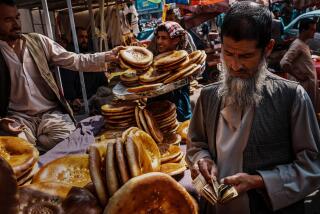Kuwaitis Face Money ‘Mess’ as Banks Open
- Share via
KUWAIT CITY — It was business as unusual Sunday at the Alahli Bank of Kuwait.
Soldiers nervously cradled AK-47s at the door while normally serene managers dressed in spotless dishdashas scurried from one teller’s station to the next. Outside, under the giant oil-fire cloud, those who had come to deposit and withdraw funds waited not-so-patiently in a line that snaked around the corner of the gleaming high-rise building.
“A new start,” beamed a ranking bank officer, surveying the scene.
“A complete mess,” snapped one customer.
In truth, it was both.
For the first time since liberation nearly a month ago, Kuwait’s 10 commercial and specialized banks opened to the public Sunday, an event marked as much by confusion as self-congratulation.
The essential problem, many Kuwaitis and foreign nationals discovered, was that much of the money they had carefully socked away during the Iraqi occupation has been deemed worthless by the Kuwait government.
After Iraqi forces last year looted gold bullion and dinar bills worth more than $2 billion from the Central Bank--the emirate’s version of Ft. Knox--Kuwaiti banking officials who had escaped the country declared that the pilfered cash was no longer valid currency.
Nonetheless, millions of dinars--each worth about $3.48 at the current rate of exchange--ended up in circulation as Iraqi troops used the illegally obtained funds to purchase supplies and services from Kuwaiti merchants.
Some here even received pension benefits paid from stolen Central Bank assets during Iraqi occupation.
“We accept these money in good faith,” said one barber. “No one believe the government really cancel this money.”
But that is exactly what happened.
Bankers and merchants estimated Sunday that perhaps as much as 25% of Kuwaiti currency presently in circulation may not be worth the stock it is printed on.
After the Iraqis were kicked out Feb. 27, Kuwaiti officials decreed that all dinars presently in circulation would be retired and more than $2 billion in new currency issued after being printed in Britain and Germany. People were told to redeem old dinars for new as soon as the banks opened.
Serial numbers, meanwhile, of the dinars stolen from the Central Bank were posted throughout the emirate, alerting businesses, banks and individuals about which bills were to be rejected as worthless.
Still, many believed that they could trade in their bad dinars for good. They found otherwise after going to the banks on Sunday.
“They won’t even give you a box of matches for these,” said one man, fanning a stack of dinar bills with his thumb. “We suffer (because) of the Iraqi soldiers. Now we suffer over our money.”
Given the lines Sunday, simply getting access to funds on deposit presented difficulties for many cash-starved Kuwaitis who had not been able to visit a bank since the Aug. 2 invasion.
Contesar Hassan said she spent nearly four hours waiting in line Sunday at her bank and never did get in. Despite having no money, she drove her two children up Arabian Gulf Street to the Sultan Center, the only open supermarket in Kuwait city, and implored the manager to let her pay him later for the groceries she needed immediately. He consented, and she filled her cart with cooking oil, rice and bottles of Mr. Clean floor cleaner.
“Saddam (Hussein) make everything bad,” she said.
On the opulent 18th floor of the Alahli Bank, the deputy chairman, Abdul Salam Alawadi, remained matter-of-fact about the long lines and dinar debate.
“It’s not a matter of feel sorry or not feel sorry,” he said. “There are many problems during the aggression.”
A high-ranking official of the Central Bank disclosed Sunday that Kuwaiti officials are investigating the possibility that one of the bank’s three managers may have let the Iraqis into the main vault.
None of the main offices of Kuwait’s banks sustained any significant damage during Iraqi occupation, although a floor vault at the Alahli Bank does bear the scars of a failed attempt to break into it.
The bank’s security manager, Khalid Bashir, said that before Iraqi forces retreated last month, he watched while the Iraqi placed in charge of the bank tried for two hours to open the floor vault, hammering away with a chisel and pipe wrench. The Iraqi finally gave up and fled town just before U.S.-led forces arrived.
“He was in a hurry,” Bashir said.
The chisel and wrench were still resting on a nearby desk Sunday.
More to Read
Sign up for Essential California
The most important California stories and recommendations in your inbox every morning.
You may occasionally receive promotional content from the Los Angeles Times.













